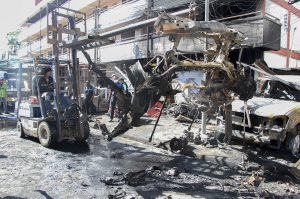Malaysia has announced a change to its facilitator for peace talks between the Thai government and Muslim separatists in the country’s Deep South, replacing the current negotiator just 18 months after his appointment.
In a statement on Friday, the government said that Mohamad Rabin Basir, a former director-general of the National Security Council, had taken over the role of Malaysian Government Facilitator for the Southern Thailand Peace Dialogue Process, effective July 1.
The statement added that the government was “very confident” of Basir’s experience and ability to carry on with the mission and to achieve a “positive and significant impact” on the ongoing peace talks. It also expressed hopes that Basir would “be able to play a more effective and constructive role in accelerating the efforts towards creating a peaceful environment in the southern border provinces of Thailand.”
The Muslim separatist insurgency in southern Thailand has been simmering for decades in the provinces of Pattani, Yala, and Narathiwat, as well as in parts of Songkhla. But the campaign escalated in the early 2000s, when rebels began bombing and launching arson attacks on police and military facilities, local government offices, and other symbols of the Thai state. In response, the Thai government declared martial law in the Deep South in 2004. In the two decades since, there have been more than 22,000 violent incidents, including attacks by both separatist groups and the Thai army, that have taken the lives of about 7,500 people.
Over the past decade particularly, Malaysia has played an important role in the conflict, facilitating contacts between the Thai government and insurgent groups like the Barisan Revolution Nasional Melayu Patani (BRN).
The past two years have brought a measure of progress, at least on paper. In February of this year, the Thai government and the BRN agreed on a roadmap to try to end the region’s long-running conflict. At the time, Zulkifli said that there was “light at the end of the tunnel” in the Deep South and that both sides were now “willing to put pen on paper.”
As Paul Chambers noted in an article published in January of this year, the prospects for the peace talks have been improved somewhat by political changes within both Malaysia and Thailand. The first important development was the election in late 2022 of Prime Minister Anwar Ibrahim, who, for both political and personal reasons, has shown an apparent desire to advance the peace process. Where Anwar’s predecessors had relied on Malaysia’s Special Branch, known for having “sympathy toward the BRN,” Anwar in January 2023, appointed Zulkifli Zainal Abidin, a former military chief with the potential to win more trust from his counterparts in Bangkok, as the Malaysian facilitator of the peace talks.
The second development was the end of nearly a decade of military and military-backed rule in Thailand under Prime Minister Prayut Chan-o-cha. Since taking office in September of last year, Prime Minister Srettha Thavisin of the Pheu Thai party has “seemed more committed” to the dialogue, and for the first time has appointed a civilian to lead the Thai government in the peace negotiations.
However, despite these more propitious circumstances, violence continues in southern Thailand. On March 22, there was a wave of coordinated bombings and arson attacks that targeted more than 40 properties across all four provinces of the Deep South, which the Thai authorities blamed on insurgents. The attacks claimed the life of a migrant worker from Myanmar. This was followed by the June 25 killing by unidentified gunmen of Roning Dolah, a prominent human rights defender, in Pattani, and a car bombing outside a residential complex in Yala on June 30, which killed a school teacher and injured 21 others.
As Zachary Abuza of the National War College in Washington told me in an interview back in February, while prospects for the peace process have improved, there are structural impediments to a rapid resolution of the long-running conflict. The most obvious of these is the continued influence of the Thai military.
“Even though it is a civilian government in Thailand, the military’s always there,” he said. “Srettha has been given his lane, and that lane is getting foreign investment in, building up exports, really being the salesman-in-chief… I think it’s very clear that his government is not going to go any further than what the military allows him to do with regard to southern Thailand.”
For similar reasons, Chambers concurred. “Deep South violence, albeit at lower than pre-2013 levels, continues,” he wrote. “It is hard to imagine an end to such violence anytime soon.”

































